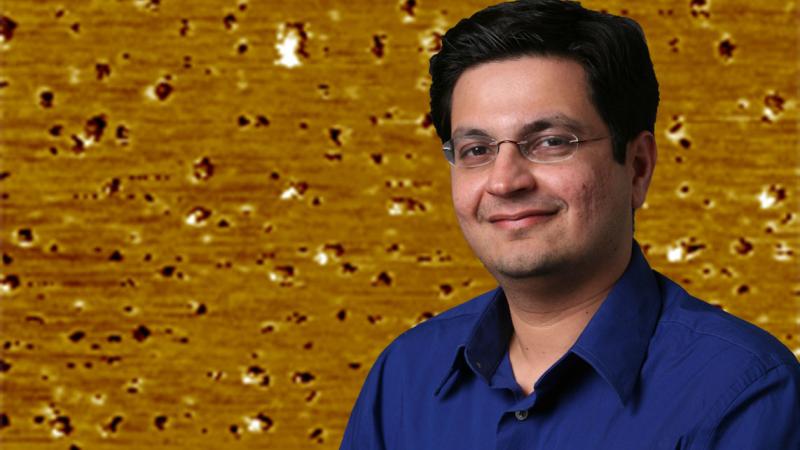August 23, 2016

Troy, N.Y. — Nanomaterials expert Nikhil Koratkar, the John A. Clark and Edward T. Crossan Professor of Engineering in the Department of Mechanical Aerospace and Nuclear Engineering at Rensselaer Polytechnic Institute, has been named a fellow of the American Society of Mechanical Engineers (ASME). The organization recognized Koratkar for his “exceptional achievement in the science and technology of one-dimensional (carbon nanotubes) and two-dimensional (graphene) nano-materials, leading to important breakthroughs in nanotechnology, energy and sustainability.”
ASME is devoted to using engineering to improve the quality of life worldwide. Its members provide expertise to meet diverse global challenges and help shape government policy. The ASME Fellow Grade, which recognizes exceptional engineering achievements and contributions to the engineering profession, is bestowed on less than three percent of over 125,000 members.
“Being elected a fellow of ASME is a wonderful recognition of Professor Koratkar’s outstanding research which represents a creative blend of fundamentals of advanced materials with high impact applications,” said Shekhar Garde, dean of the School of Engineering. “Nikhil continues to be a leader in his field, and differentiates himself from his peers by his unconventional thinking and extraordinary intuition. His work is harnessing modern micro and nanoscale materials science for important applications in energy and sustainability. We congratulate him on this special honor.”
Koratkar’s research is positioned at the intersections of nanotechnology, energy, and sustainability. His research focuses on the synthesis, characterization, and application of nanoscale materials, such as graphene, phosphorene, carbon nanotubes, transition metal dichalcogenides, as well as metal and silicon nanostructures. He is studying the fundamental mechanical, electrical, thermal, magnetic, and optical properties of these one- and two-dimensional materials and developing a variety of composites, coatings, and device applications using these low-dimensional materials.
Koratkar’s research at Rensselaer fulfills the vision of The New Polytechnic, an emerging paradigm for higher education which recognizes that global challenges and opportunities are so great they cannot be adequately addressed by even the most talented person working alone. Rensselaer serves as a crossroads for collaboration—working with partners across disciplines, sectors, and geographic regions—to address complex global challenges, using the most advanced tools and technologies, many of which are developed at Rensselaer. Research at Rensselaer addresses some of the world’s most pressing technological challenges—from energy security and sustainable development to biotechnology and human health. The New Polytechnic is transformative in the global impact of research, in its innovative pedagogy, and in the lives of students at Rensselaer.
Koratkar has published over 150 archival journal papers, including several in Nature series journals. His publications have received over 9,800 citations. His work in nano-structured materials for lithium-ion batteries has resulted in a start-up company (Ener-Mat Technologies), which is aimed at commercializing graphene electrodes for next-generation energy storage solutions.
Among other honors, Koratkar won a 2004 National Science Foundation Faculty Early Career Development (CAREER) Award, the Electrochemical Society’s SES Young Investigator Award in 2009, and the ASME's Gustus L. Larson Memorial Award in 2015. Koratkar has served as an editor of the Elsevier journal Carbon since 2010.
Koratkar joined the faculty of the Department of Mechanical, Aerospace, and Nuclear Engineering at Rensselaer in 2001 as an assistant professor, with a promotion to associate professor in 2006, and full professor in 2009. In 2011, he was also appointed a full professor in the Materials Science and Engineering Department at Rensselaer. Koratkar was named the John A. Clark and Edward T. Crossan Professor of Engineering in 2012.
Koratkar earned his bachelor’s degree from Indian Institute of Technology in Bombay, India; and went on to earn his master’s and Ph.D. in aerospace engineering from the University of Maryland in College Park.
About Rensselaer Polytechnic Institute
Rensselaer Polytechnic Institute, founded in 1824, is America’s first technological research university. The university offers bachelor’s, master’s, and doctoral degrees in engineering; the sciences; information technology and web sciences; architecture; management; and the arts, humanities, and social sciences. Rensselaer faculty advance research in a wide range of fields, with an emphasis on biotechnology, nanotechnology, computational science and engineering, data science, and the media arts and technology. The Institute is has an established record of success in the transfer of technology from the laboratory to the marketplace, fulfilling its founding mission of applying science “to the common purposes of life.” For more information, please visit http://www.rpi.edu.